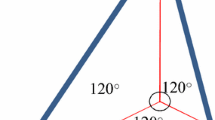Abstract.
McKelvey [4] proved that for strong simple preference aggregation rules applied to multidimensional sets of alternatives, the typical situation is that either the core is nonempty or the top-cycle set includes all available alternatives. But the requirement that the rule be strong excludes, inter alia, all supermajority rules. In this note, we show that McKelvey's theorem further implies that the typical situation for any simple rule is that either the core is nonempty or the weak top-cycle set (equivalently, the core of the transitive closure of the rule) includes all available alternatives. Moreover, it is often the case that both of these statements obtain.
Similar content being viewed by others
Author information
Authors and Affiliations
Additional information
Received: 13 October 1997/Accepted: 24 August 1998
Rights and permissions
About this article
Cite this article
Austen-Smith, D., Banks, J. Cycling of simple rules in the spatial model. Soc Choice Welfare 16, 663–672 (1999). https://doi.org/10.1007/s003550050167
Issue Date:
DOI: https://doi.org/10.1007/s003550050167




